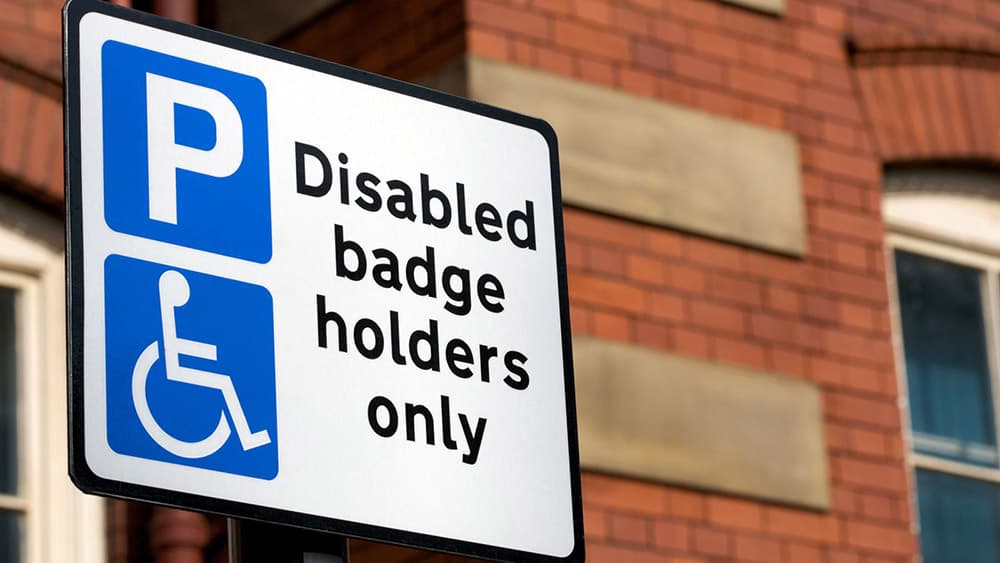Blue badge scheme extended to those with hidden disabilities including dementia and anxiety
Marking the biggest change to the Blue Badge scheme since the 1970s, the Department for Transport has announced that people with less visible disabilities will be able to apply for Blue Badges, leading some to question if it will adversely affect those with physical disabilities.
Commencing on the 30th August 2019, the announcement from the government followed the publication of new guidance for local authorities in England after an eight-week consultation on widening the eligibility criteria.
Under the scheme extension, people who cannot walk as part of a journey without considerable psychological distress or the risk of serious harm, such as those living with dementia, autism, and anxiety, will be eligible to apply.
Transport Secretary Chris Grayling said: “As a society, we don’t do enough for people with hidden disabilities.
“I hope this change to Blue Badge guidance will make a real difference to people’s lives.”
Traditionally, the Blue Badge scheme has been aimed disabled people with severe mobility problems to access goods and services, by allowing them to park close to their destination and is open to eligible disabled people, irrespective of whether they are travelling as a driver or as a passenger.
The extension of the scheme will see the number eligible to apply for badges increase sharply, with the Government to provide an extra £1.7million to councils in the first year of the programme help manage the expected increase in applications.
While the new criteria published by the government gives clear and consistent guidelines on Blue Badge eligibility for England, not everyone with non-physical disabilities will qualify for a badge says the Department, with local authorities having the final say regarding if an applicant meets the eligibility criteria.
A welcome change
In response to the announced extension, a number of organisations and charities campaigning and supporting various hidden disabilities have welcomed the change.
Jane Harris, Director of External Affairs at the National Autistic Society, said: “The changes will make a huge difference to thousands of autistic people and their families across England – helping them to go out in the way many others take for granted.
“Just leaving the house is incredibly difficult for many autistic people – and involves detailed preparation. Some autistic people have no concept of the dangers of the road while others are so anxious about plans going wrong, like not being able to find a parking space, that they don’t go out at all. Having a Blue Badge will be life-changing and help many to reduce loneliness and isolation.”
Kamran Mallick, Chief Executive of Disability Rights UK, commented: “The Blue Badge Scheme is an important and essential part of ensuring that we, disabled people, can participate and live our lives in society.
“With public transport not universally accessible the use of a car is essential for many.
“Being able to park closer to the destination is essential for badge-holders and can mean the difference between going out or not.”
A risk of being oversubscribed and under-resourced?
The expansion of the scheme has led some organisations and individuals to question whether the scheme, which was designed for those with mobility needs, may potentially adversely impact those with physical disabilities and undermine the scheme’s effectiveness.
Discussing the implications of a widespread rollout of the intended Blue Badge scheme expansion in August, Disabled Motoring UK (DMUK) – a charity campaigning for disabled drivers, passengers and Blue Badge holders – cautioned that the scheme could become meaningless if there are no disabled spaces available.
DMUK CEO, Graham Footer commented: “DMUK works to support the mobility of disabled people and there is no dispute that people with certain mental health conditions and cognitive disabilities could benefit from having a Blue Badge. However, the charity is concerned that increasing the numbers of Blue Badge holders will put more pressure on limited disabled parking which is poorly enforced and in some areas of the country not enforced at all. We are particularly concerned about how this will impact on wheelchair users.
“In light of this recent extension DMUK would like to see the government put more pressure on local authorities to enforce the scheme to make sure it benefits genuine Blue Badge holders. The charity is very concerned that without adequate enforcement the integrity of the scheme will be undermined and of no benefit to any disabled person.”
In addition, disabled rights campaigner and founder of International Wheelchair Day, Steve Wilkinson, (also known as WheelchairSteve), expressed concerns over the impact the rollout would mean for blue badge holders with mobility needs.
Read Steve Wilkinson’s Guest Post on the potential disadvantages of the governments Blue Badge scheme changes.
https://thiis.co.uk/blue-badge-scheme-extended-to-those-with-hidden-disabilities-including-dementia-and-anxiety/https://thiis.co.uk/wp-content/uploads/2019/06/blue_badge_extension.jpghttps://thiis.co.uk/wp-content/uploads/2019/06/blue_badge_extension-150x150.jpgGovernment & Local AuthoritiesNewsroomThird SectorBlue Badge Scheme,Chris Grayling,Department for Transport,Disability Rights UK,Disabled Drivers,Disabled Motoring UK,International Wheelchair Day,legislation,local authorities,National Autistic Society,Steve Wilkinson,WheelchairSteveMarking the biggest change to the Blue Badge scheme since the 1970s, the Department for Transport has announced that people with less visible disabilities will be able to apply for Blue Badges, leading some to question if it will adversely affect those with physical disabilities. Commencing on the 30th August...Calvin BarnettCalvin Barnettcalvin.barnett@bhta.comAuthorTHIIS Magazine


